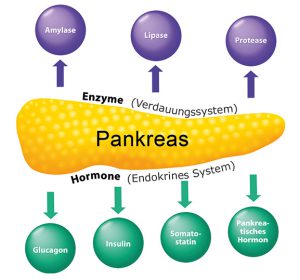The importance of enzymes for health and nutritional status:
The state of digestive health largely determines a person’s overall well-being. The control over this complicated system can contribute to improving health and well-being. Enzymes play a crucial role here.
Enzymes are simple proteins which are present in every living cell of the organism. They serve as “biological catalysts” to regulate various biochemical reactions, including digestion. Enzymes help the digestive system absorb, degrade and excrete food and nutrients. Each enzyme has three primary groups of digestive enzymes: proteases, lipases and amylases, which activate the digestion of proteins, fats and carbohydrates.
There are major differences between microbial/plant enzymes and enzymes obtained from animal sources: plant and microbial enzymes have a much broader pH range and can act throughout the digestive tract. The pH environment of the digestive tract is very variable and can range from very acidic in the stomach to very alkaline in the small intestine. Most enzyme supplements derived from animal sources are therefore coated with an enteric coating because they are not stable enough and their effectiveness can be impaired by the acid content in the stomach area.
Enzymes from microbial or plant sources are stable in a much broader spectrum and are excellent for survival and activity throughout the gastrointestinal tract.

If the digesting system does not function correctly this may result in a lot of health problems such as poor food utilization, weight problems, nausea, flatulence, constipation, stomach pains and diarrhoea, as well as serious conditions such as heartburn, irritable bowel syndrome, immune and neurological problems and hormonal imbalance.
Several factors are known to adversely affect digestive health, such as problematic lifestyle, eating habits, stress, age, genetics, food additives and chemicals, and physical inactivity.
These factors reduce the body’s natural ability to produce certain pancreatic enzymes such as lipase, amylase and other additional pancreatic enzymes that play an important role in the digestion of macronutrients. Therefore, a loss of healthy digestive function associated with enzyme insufficiency can lead to malabsorption and a number of related health problems if the enzyme insufficiency is not addressed.
Here, enzyme supplementation can help to compensate for the deficits that have arisen.
The most important digestive enzymes:
- α Amylase: Divides coal hydrates such as strength, Glycogen and Polysaccharide into smaller, digestible units (e.g. simple sugars).
- Cellulase: Decomposes cellulose and Chitin and helps thus to set nutrients free in fruit and vegetable.
- Lipase: Degrades lipids, improves fat utilization and supports a healthy gallbladder function.
- Protease: Degradation of proteins and peptides, support of immune function.
- Lactase: Decomposes lactose (milk sugar) and is useful in lactose intolerance.





